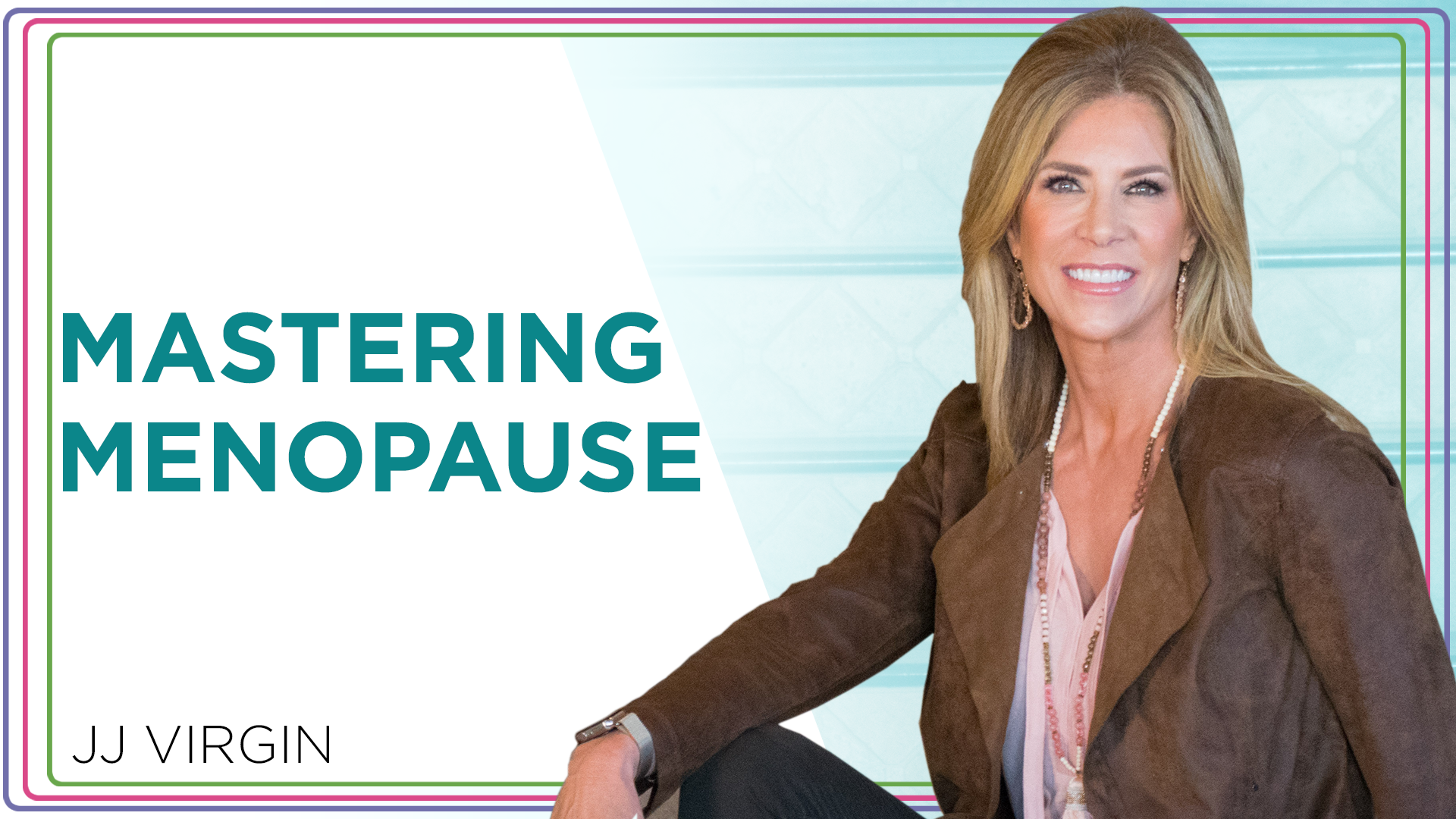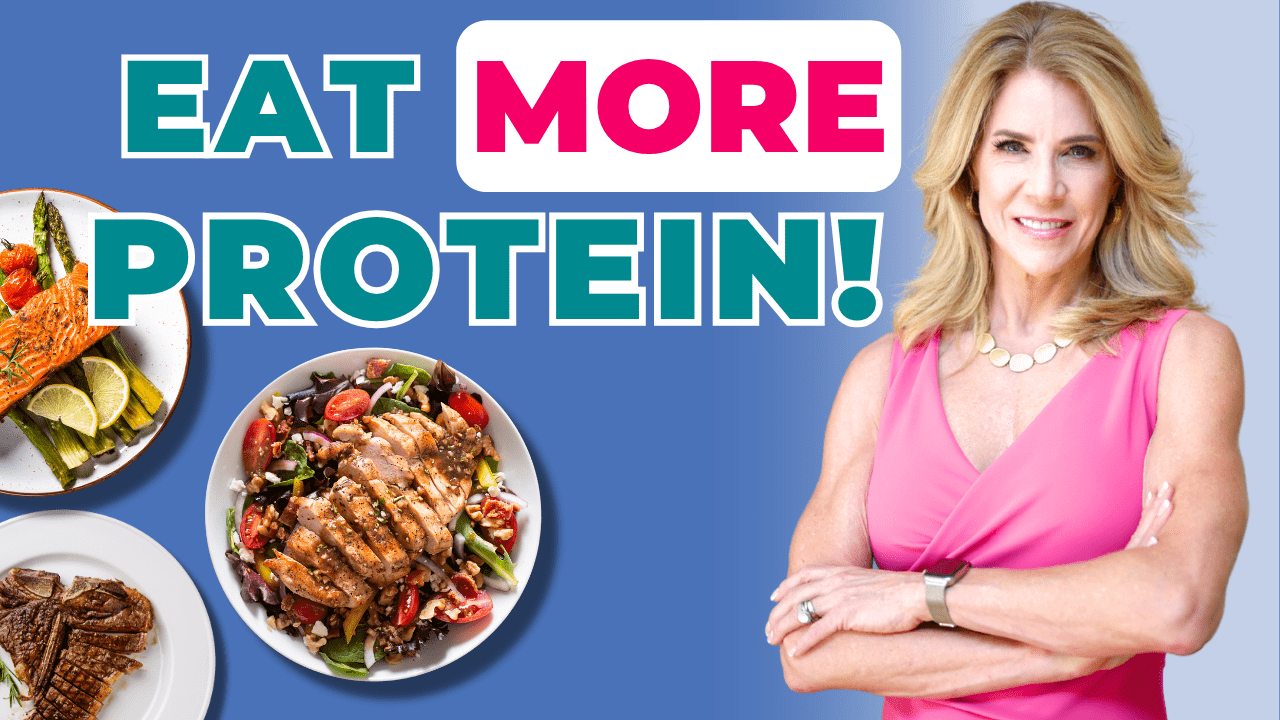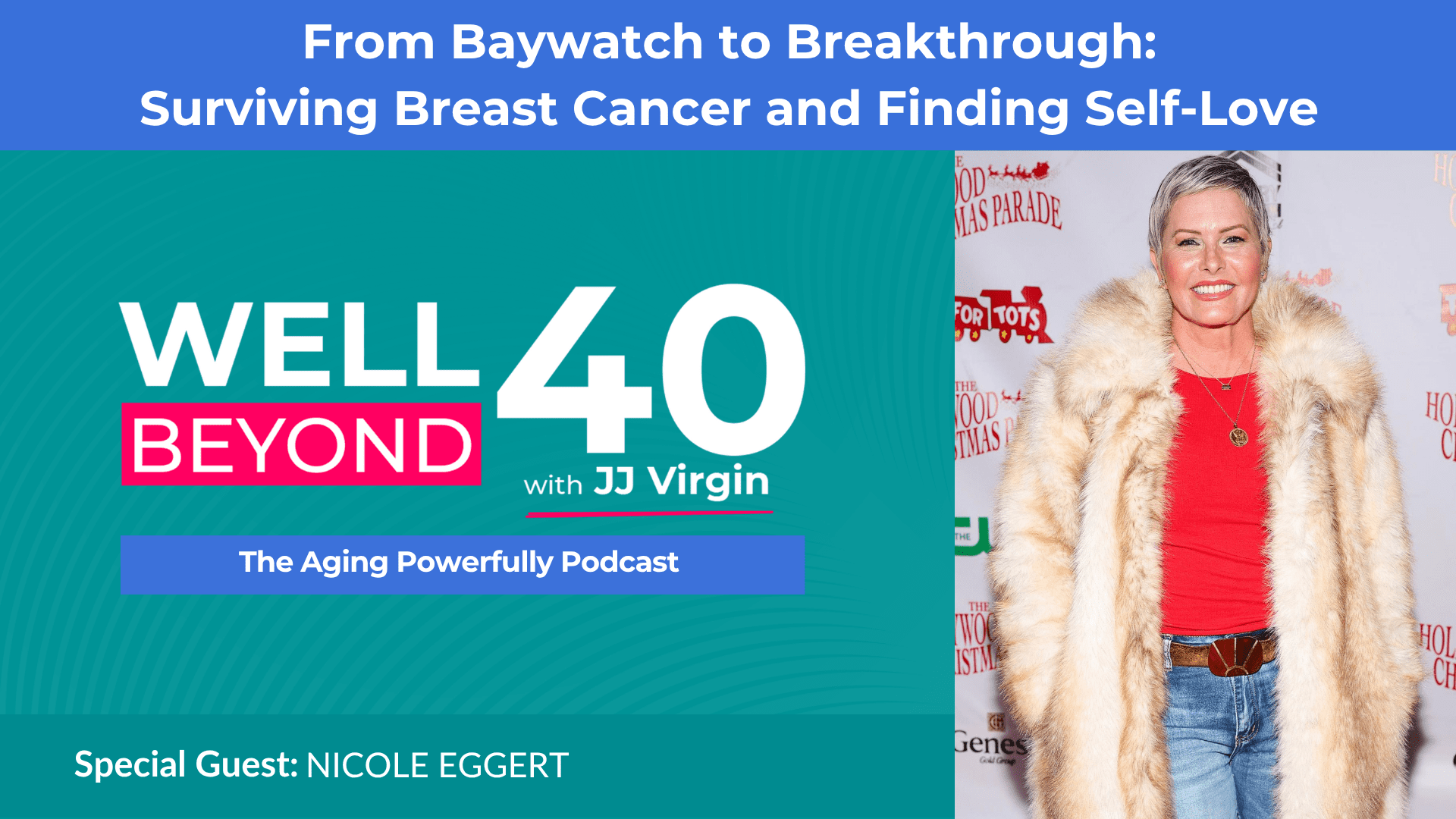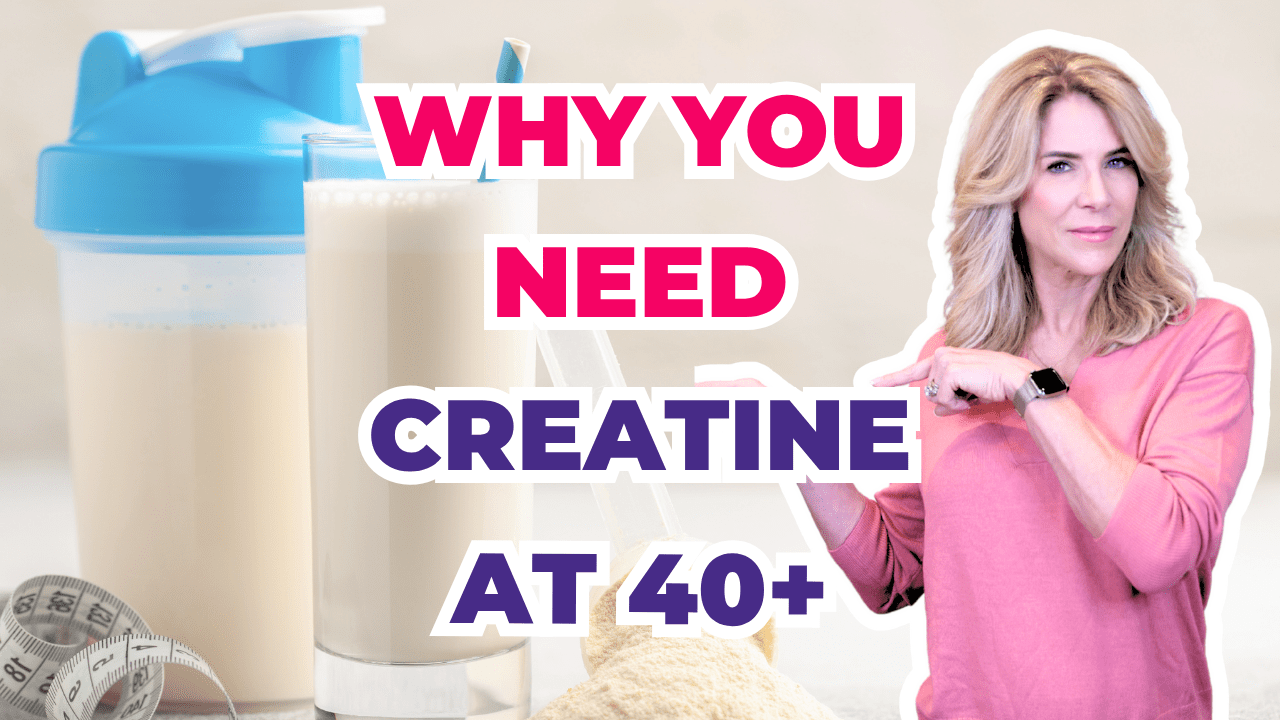How to Manage Menopausal Symptoms to Look & Feel Your Best
When you hear the word menopause, you might imagine miseries like night sweats, mood swings, and weight gain. But I’m living proof that when you incorporate these 6 strategies, you can manage menopausal symptoms and move through this transition feeling better than ever. Here, you’ll learn how labs can help you understand your hormones, the 2 hormones balance for stress management, the most important measure to determine whether you’re metabolically healthy, why TSH alone isn’t an appropriate measurement to determine thyroid health (and what to look for instead), the one vitamin you need to measure, what to know about bioidentical hormones, plus the 3 critical supplements to use during menopause. Whether you’re approaching or going through menopause right now, these key strategies will help you manage menopausal symptoms and make this transition smoothly.
Mentioned in this episode:
Watch the FULL VIDEO on JJ’s Youtube Channel
Learn how to better manage stress in this video
Order an advanced thyroid panel (plus find more tests) here
Learn all about insulin resistance and how to prevent it here
Hear why vitamin D is so important
Listen to my talk about managing menopause with Dr. Anna Cabeca
ATHE_Transcript_Ep 424_YT 16
JJ Virgin: [00:00:00] Hey, this is JJ Virgin. Thanks so much for joining me. This is ask the health expert. In each episode, I put the power of health in your hands and share ways to get healthy, lose weight, heal your gut detox and lots more. So you can look and feel better fast if you’d rather watch the video. Hey, I did put on my makeup and do my hair.
So check it out on my YouTube channel
menopause. Yep. I said it and I bet I can guess what picture instantly jumped in your mind? Future you. Night sweats, mood swings, weight gain. And I get it because that’s what we’re always told to expect, but I’m living proof. You can come out the other side better than ever in [00:01:00] fact, better than before. So I’m going to share six key things you have to do to make sure that you come out better on the other side too.
Hey, it’s JJ to make sure you don’t miss out on more ways to get and stay healthy. Hit the and subscribe. So you get more videos like this. Okay. So if you’re heading into menopause, I can help because I’ve been there. And from my experience, I can tell you, there are six things you’re going to want to do to make the transition.
Easy as possible. And to make sure you don’t end up miserable, like all those horror stories, and I’ll start by giving you a happy heads up that the biggest challenge with menopause is when you’re going through it, once you’re through it, it’s way easier to balance your hormones because they’re no longer a moving target like there when you’re in the middle.
And man, are they a moving target when you’re in the middle of it? So this video is all about helping you prepare for this transition and to lessen the impact it has on [00:02:00] your physical and mental health. Now, before we get into the six things to do, it’s important to know that in general, you’ll want to get really clear on what fluctuations in your hormones feel like take the time to tune into your body.
Trust me understanding what’s happening when you’re going through these changes is going to help tremendously. Now, one really effective way to do this is to use labs all the way through to connect your hormone levels, to what you’re feeling. They can give you a really good picture of what’s going on, but you got to remember, labs are just a little snapshot in a moment in time, and your hormones are gonna fluctuate all throughout the day and all throughout the month.
So labs are really useful, but look at them as a. Not as if they’re etched in stone and help you understand what you’re feeling. I’ll share some of the things that I noticed when I was going through it and how they helped me pinpoint what I needed along with the labs that I ordered. Okay. So first thing, number one, [00:03:00] heading into menopause.
One of the key things you want to make sure of it is that you really have your stress handled. Now I’m going to tell you right as I was heading in. My 16 year old son was hit by a car hit and run driver and left for dead in the street. And we spent four and a half months in the hospital, some of that life and death situation.
So this, I say, this is critical and do the best you possibly can. Right? Your stress is managed by cortisol and DHEA, which are two hormones produced by your adrenal. So that means you’re going to have to make sure you’re treating your adrenal glands. Well, because your adrenal glands are going to take on a bigger burden as you go through menopause.
And if you aren’t ready for that, and your cortisol is high, like my situation, you won’t have the support you need from your adrenal glands. Okay. So how do you do that? Well, you can check your adrenal glands by doing either a stress survey or doing an adrenal salivary cortisol test. So you can really see how well your [00:04:00] cortisol and DHEA are working.
And I’m going to put the information on that adrenal salivary cortisol test in the links below. That’s super important because studies tell us that a high DHEA cortisol ratio mean higher DHEA levels and cortisol levels may help you reduce the negative impact of stress. And then if you find out that you’re not handling stress well, you’ll want to listen to my podcast or watch my video on specific ways to handle stress so you can deal with it better and not let it take you down.
And just think about what I went through. If I hadn’t had great stress tools in place, things could have gotten a way, lot worse. So this is priority. Number one. Now, number two, the next thing you’ll want to do is make sure you’re metabolically. Part of that is getting to an ideal body composition for you.
Your body composition is based on how much fat and lean body mass you have, and you’re healthier when you’re higher and lean [00:05:00] body mass compared to your body fat. Substantially by the way, like 75, 80% of your body is lean body mass compared to body fat. So if you’re trying to lose weight to improve your body composition, try to do it before menopause is in full swing.
And remember, in order to lose weight, you need to get healthy first. So we’re going to be really focused on what you need to do to be what I call metabolically. Now being metabolically healthy obviously means being healthy overall, but specifically it means not having metabolic syndrome. So you want ideal measurements for fasting, blood sugar levels, triglycerides, HDL, cholesterol, blood pressure, and your waist circumference because.
Any of these is off, but if you’ve got a couple of them off specifically, you’ve got metabolic syndrome and metabolic syndrome set you up for heart disease, diabetes, stroke, all sorts of really scary [00:06:00] stuff, but it also makes it super hard for you to lose weight. Now, if all of these things, the most important measure of whether you’re metabolically healthy or not is of course blood sugar control.
Because if you’ve got your blood sugar balanced and in the normal range, most of those other things are going to be better too. So you really need to focus on what you need to do to get your blood sugar under control. Check out my video on how to balance your blood sugar and how to make sure you stay insulin sensitive.
That’s a good place to start because as you go through menopause, It can become easy to become insulin resistant and you do not want that to happen. And one of the ways to prevent it from happening is to make sure that you pack on some lean muscle on your body. Now that does not take hours at the gym or any expensive equipment, look into strength or resistance exercise, you can do easily at home every single day.
Now, one of the ones I love the most is something called. TRX trainer. These are around a hundred bucks. You can get them everywhere like Amazon, you can [00:07:00] put them into a door jam at your house. Or I attached one outside on a tree and you can get a full body workout, resistance training, workout, and build muscle.
Why is this important? Well, muscle helps your metabolism more muscle is make sure basal metabolic rate higher. It also helps your blood sugar balance. It helps your body be more glucose, tolerant, and more insulin sensitive. So you don’t have to have as big of an insulin spike to get your blood sugar balanced, and it helps your bones.
And besides that, you know, when you’re exercising, you’re helping your heart too. So again, That helps you be metabolically healthy. All right, let’s talk number three. You want to make sure that your thyroid is functioning at its absolute best, not just in the reference range and passable, but functioning optimally.
So you want to get it tested to now. Ideally, you’re getting your TSH. Your thyroid stimulating hormone. And that should be somewhere between 0.5 and [00:08:00] 1.5. If you look at the reference range, that’s in the low end of the reference range, that reference range is way too high. And here’s the thing. TSH is just one measurement, but it doesn’t tell you all that could be going on with your thyroid.
And since your thyroid regulates your metabolism, a lot can be impacted. If it’s not functioning properly, your weight, your energy, your cognitive function, your temperature, sensitivity, your skin, the ability to balance your hormones. I mean, you can be a hot mess if you’re not on top of your thyroid. And if it’s just a little out of range, so work with a functional medicine doctor who will check more than just your TSH to get a complete picture.
And help make sure that your thyroid is really kicking butt for you, you want to check not just your TSH, but your free T3 and T4, your thyroid antibodies and reverse T3. Now, if you don’t have, or can’t get to a functional medicine, doc, don’t worry. There are other ways to get tested. I work with yourlabwork.com.
They’re a [00:09:00] company that can do these tests for you, and you can deal with them directly. So whichever way you go, remember you need more than that single TSH test to get the big. All right. Number four. You also need to make sure your vitamin D is where it needs to be. Now. Vitamin D is not technically a vitamin.
It turns out it’s really a pro hormone because it turns into a hormone when you get outside and get some sunshine. And if you’re going through menopause, vitamin D is extra important. You need it to help you absorb calcium. And of course, as you always hear for strong bones to help prevent osteoporosis, but it’s also anti-inflammatory, which makes it super important for your immune system.
But maybe the biggest thing though, is that it helps your brain because menopause brain fog. It’s a real thing. And so many people are low in D like so many. So you want to make sure that you’re testing and the tests you want to do is the 25 [00:10:00] hydroxy vitamin D test. And then you want to supplement vitamin D3 with vitamin K one and two to get to your, between 50 and 80.
NG Per ML. I will tell you, I can’t ever think of a time I’ve seen someone’s lab work and seen them an optimal levels of vitamin D without supplementation. And again, make sure that you take those two together because that will help you absorb calcium and direct it to the right place. Okay. Moving on to number five, now, number five is hormones.
So all of our hormones work together. So when menopause hits and they start to drop your whole system can be thrown for a serious loop. And this is where all that mayhem can happen. So I have lots to share here. Now, one of the things I recommend is using bio-identical hormones, they can be a huge help. And I know there’s a lot of different schools of thought here on hormone replacement, but I can tell you when your hormones are going down and they’re [00:11:00] out of whack and everything’s upside down and you’re having hot flashes and gaining belly fat and.
I’m feeling way old and feeling like you want to crawl out of your body, you will see bio-identical hormones as a godsend. They’ll help you make sure that you don’t lose your sex drive or get brain fog or anxiety or depression. You want to feel like you want to get back in your body again. So if you decide to go that route that you want those bio-identical hormones, make sure they’re bio-identical because you want to replicate the exact molecular structure of the hormones.
Your body’s produces. All right. And one other thing about bioidentical hormones. What I always say is you’re working with your adrenals. You’re working with your thyroid. You’re making sure that you’ve got your diet lifestyle dialed in so that you can use the least amount that you need to do. All right. So here’s some specifics about what’s going on with your hormones as you go into menopause.
The first thing you’ll start to notice is [00:12:00] progesterone dropping. Now, how would you notice this while your periods may become irregular, and your stress hormones start to come up. You might feel more anxious, more irritable, and you’re not sleeping well. So you can actually take a little bioidentical progesterone to help offset that, especially great at night to help with sleep and you cycle it during your period.
So you want to work with the functional medicine doctor to help you know exactly how you use this correctly. Now they may suggest you take it with estrogen with estradiol but either way, you’ll take the progesterone for about 12 to 14 days before your. Now not only can progesterone help you sleep better at night, but if you add in some of my sleep candy and magnesium body calm, then sweet dreams.
And boy, will that be a relief, because when your sleep starts getting messed up, all right, the next thing to happen is that estrogen, testosterone and DHEA start to drop. Now, the drop in estrogen can cause release of higher amounts of other [00:13:00] hormones. And then your thermostat starts to go haywire and boop, there goes those hot flashes.
So one way to address that is to shift your diet by eating more phytoestrogens. And those are things like flax and garbanzo beans. Hummus and tahini can be great here. And then to address the low DHEA you may want to start by supplementing with DHEA and it’s just a little bit like five to 10 milligrams because it can help bring up your testosterone and estrogen.
And then when that’s no longer enough, you can work with your functional medicine doctor to talk about getting on bio-identical hormones, estrogen, and testosterone. Now low progesterone affects your mood too, not just your sleep and low estrogen also impacts your ability to burn fat and can put you at cardiovascular risk and also impacts your ability to recover from the gym testosterone also impacts recovering.
But I’ll get to that whole testosterone story next. Now low estrogen will also start to make you feel kind of dry [00:14:00] everywhere. So bioidenticals will help with all of that as well. If you need it, there are also other signs. Your estrogen is slipping. You’ll probably see your bad cholesterol go up. Your LDL will go up and something called LP little a, which is a very atherogenic type of LDL.
Cholesterol can go up as well. And that is the big risk factor for heart disease. The worst. Is that you feel a little bit like you want to crawl out of your skin. And that feeling comes both from the low progesterone and the low estrogen. All right, next up is testosterone. Now I mentioned the gym. I knew as soon as my testosterone was low, that it was low because I just couldn’t recover from the gym.
I’d go work out and I just couldn’t come back from it. As fast as I was used to when testosterone drops, you have a much harder time building muscle and you won’t have the libido you used to have. So be prepared for that. And again, talk with your functional medicine doc, because supplementing with testosterone may make sense for you.
And if it does [00:15:00] the gym’s going to be easier. Sex drive comes back. Now, if bioidenticals aren’t in the cards for you, there are supplements you can try or ideally try them first and then move onto the hormone replacement therapy as needed. All right. Number six, since I mentioned it, number six. Now here’s, what’s really important.
You want to make sure you’re called doing something called dim, because dim helps your body balance estrogen levels. Now your body actually makes dim from cruciferous veggies like broccoli, but you got to supplement this because you’re not going to get enough. You also are going to want to take some cocuten because it’s going to help with your energy.
And also it’s great for your heart. And then the third supplement I add is something called annatto EgG. So annatto E which are Delta and gamma tocotrienols is a very cardiovascular, protective and brain protective formula. And it’s also been found to help with hot flashes and bone health. [00:16:00] And then the GG compound in annatto egg is there to help support your home hormone production and your cocuten production Huge!.
So that’s what I put together for my personal menopause formula. And it made a huge difference for me. Now, if you want to check them out, I’ll put information on those supplements, the links below too. The bottom line here. Is there a lots of things you can do to keep menopause from being horrible for.
Don’t fall into that trap. Don’t go in believing that you have to suffer because you don’t do these things I’m suggesting, and you may actually sail through it. All right. Don’t forget to like and subscribe so that you can stay up to date on ways to get and stay healthy. And in the next video, I’m going to give you surprising and non diet related tips.
For better blood sugar control. See you there.
for more info on this and other health topics I cover or to rate and review, [00:17:00] find me on Instagram, Facebook and my website, JJvirgin.com. And don’t forget to subscribe to my show. So you won’t miss a single episode. Go to subscribetojj.com. Thanks again for being with me this week. .

 Subscribe to our show
Subscribe to our show 




